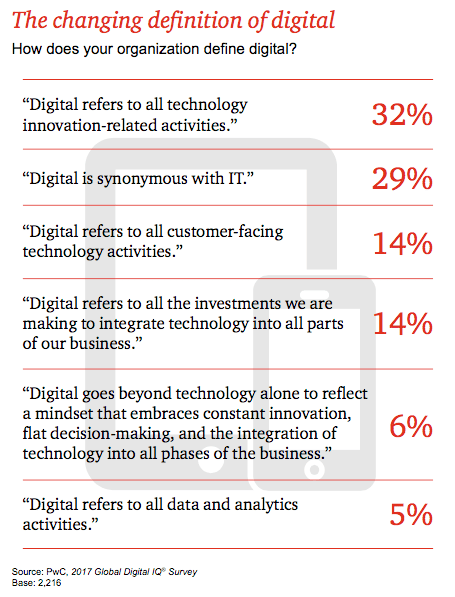Chart of the Day: What is digital strategy?How many in business simply see digital as equalling IT?
Helping businesses create and implement digital marketing strategies is one of our main aims at Smart Insights. While it's straightforward for us as marketers to define digital marketing strategy in terms of different digital communications to support goals of increasing online leads and sales, defining digital strategy is more difficult. The reason is that for many business managers 'digital' is still often simply taken to mean 'technology' or IT.
I was reminded of this limited understanding of 'digital' in the wider business when reviewing this PwC report on organizational Digital IQ, now in its 10th year. In this report survey, respondents are IT managers, CIOs and general business managers. This visual shows how businesses struggle to define 'digital' in a consistent way. When asked to select from one definition of digital, these were the responses:

You can see that the two most popular definitions relate to technology and IT rather than how it is used to support the business through improving customer-facing processes or innovation activities. I think this response is down to the respondents being business and IT leaders rather than marketers who would see integration and innovation as being key goals.
'Digital strategy' is a strategic plan formulated to achieve specific goals through a digital medium. As you can see from the research above, the meaning of this can vary depending on your position in a company. Marketers and salespeople will see a digital strategy as meaning increased leads and sales, whereas IT and operations employees would look for cloud-based system and data analytics. That is why it is always best to use a specific term related to the strategy's goals, such as digital marketing plan, digital development plan, and so on.
- Source: PwC 2017 Digital IQ report
- Sample: 2,216 respondents from large organizations in 53 countries. Respondents were evenly divided between IT and business leaders. Reflective of the distribution of respondents globally, 62% work in organizations with revenues of $1 billion or greater, and 38% have revenues between $500 million and $1 billion.
- Recommended member resource: Digital Transformation Toolkit







